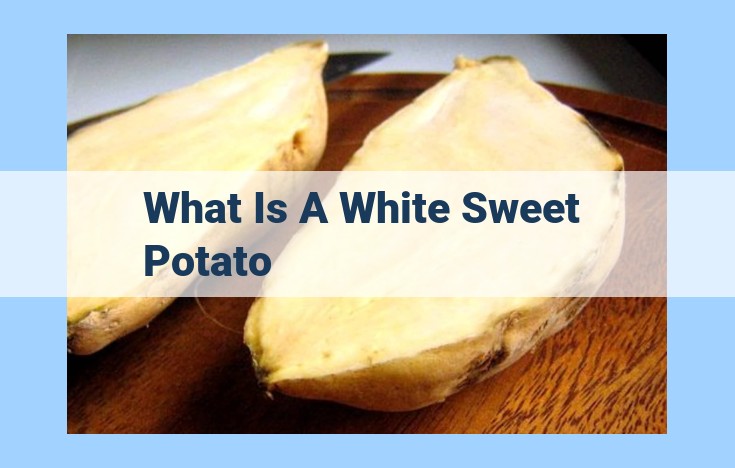White Sweet Potato: A Comprehensive Guide To Its Health Benefits, Culinary Value, And Origin

Ipomoea batatas var. alba, commonly known as the white sweet potato, is a distinctive variety prized for its pale flesh and subtly sweet flavor. Originating in South America, this nutritious vegetable boasts a rich history dating back to ancient cultivation practices. Its nutritional profile is exceptional, offering an abundance of vitamins, minerals, and dietary fiber. The low glycemic index makes it ideal for blood sugar control, while its antioxidant properties contribute to overall health. In culinary applications, white sweet potatoes excel in a variety of dishes, including soups, salads, and desserts.
Unveiling the Wonder of the White Sweet Potato: A Culinary and Nutritional Delight
In the realm of root vegetables, the white sweet potato (Ipomoea batatas var. alba) stands out as a gem of culinary and nutritional excellence. With its ethereal white flesh and delicately sweet flavor, this versatile tuber has captivated taste buds and nourished bodies around the globe.
The white sweet potato is a culinary chameleon, adapting seamlessly to a wide range of dishes. Whether roasted, mashed, or fried, it delivers a unique and satisfying taste experience. Its mild sweetness complements savory dishes such as soups, stews, and curries, while its creamy texture lends itself perfectly to desserts like pies and cakes.
Origin and History of the White Sweet Potato (Ipomoea batatas var. alba)
Tracing its Roots to South America
The white sweet potato, a culinary delight with its distinct pale flesh, finds its origins in the fertile lands of South America. Its cultivation can be traced back centuries, with evidence suggesting its presence in Peru and Ecuador as early as 5,000 BC. Ancient civilizations, such as the Incas and Mayans, revered the plant for its nutritional value and versatile culinary applications.
From South America to the World
The introduction of sweet potatoes to Europe occurred during the 15th century, brought over by Spanish explorers returning from their voyages to the New World. With their adaptability and ease of growth, sweet potatoes quickly gained popularity in Europe and were soon widely cultivated in many countries. From Europe, the sweet potato embarked on a global journey, spreading to Africa, Asia, and eventually to North America.
Convolvulaceae Family: A Shared Lineage
The white sweet potato belongs to the Convolvulaceae family, a diverse group of plants that includes over 50 genera and 1,000 species. This family is characterized by its climbing or trailing habit, alternate leaves, and often showy flowers. Other notable members of the Convolvulaceae family include morning glories, bindweeds, and ipomea.
Nutritional Value and Health Benefits of White Sweet Potatoes
White sweet potatoes, a delectable variety of Ipomoea batatas, boast an impressive array of vitamins, minerals, and antioxidants. These nutritious tubers are a nutritional powerhouse, providing a multitude of health benefits that make them a valuable addition to a well-balanced diet.
Vitamin and Mineral Abundance
White sweet potatoes are a rich source of vitamins, including vitamin A, vitamin C, and vitamin E. Vitamin A is crucial for healthy vision, while vitamin C supports immune function and vitamin E acts as an antioxidant shield against cellular damage. They are also a good source of minerals such as potassium, manganese, and magnesium, essential for regulating blood pressure, energy metabolism, and muscle function.
Blood Sugar-Balancing Properties
One of the key health benefits of white sweet potatoes is their low glycemic index. This means they release sugars slowly into the bloodstream, preventing spikes in blood sugar levels. This makes them a suitable food choice for individuals with diabetes or those at risk of insulin resistance.
Gut Health Support
White sweet potatoes are an excellent source of dietary fiber, both soluble and insoluble. Soluble fiber forms a gel in the digestive tract, slowing down digestion and promoting feelings of fullness, while insoluble fiber adds bulk to stool, improving bowel regularity.
Antioxidant Powerhouse
White sweet potatoes are a rich source of antioxidants, including beta-carotene, anthocyanins, and caffeic acid. These antioxidants fight against free radicals, which are unstable molecules that can damage cells and contribute to aging and chronic diseases. By neutralizing free radicals, these antioxidants help protect the body from these harmful effects.